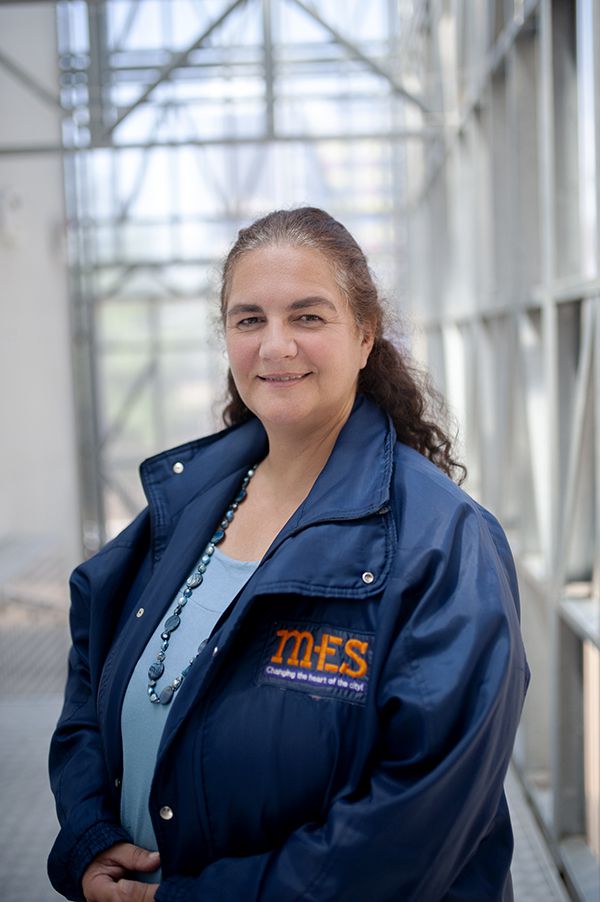
Leona Pienaar CEO of MES
After years of being an isolated invisible community, the spotlight finally fell on homelessness and the extent of the problem in South Africa. From day one of the Nationwide Lockdown, many were forcefully removed and placed into shelters, with little warning nor any time to prepare. Some were separated from their social groups, and others worried about losing “their spots” on specific corners. As an NPO serving this very community, we had to make quick decisions on whether to quarantine the people we serve, how to protect staff and volunteers, or whether to shut down operations completely until the pandemic subsides. Even with a 30 year track record of looking out for the destitute, a pandemic like this made it extremely difficult for us to do what we are called to do. Despite the lockdown, however, MES continued to offer the much needed services we could to help save lives.
Working together has achieved so much
On the numerous occasions that our President Cyril Ramaphosa has addressed the nation[1], he has emphasised the importance of working together to get to a solution for this pandemic. To paraphrase, if we are not strategic and quell the fears of our people, the pandemic will have a far-reaching impact on all of us, especially on those who are poor and destitute. MES took this word on board and has since strengthened partnerships and collaboration with various stakeholders for the good of our community.
There has been massive collaboration effort with volunteers, individual and corporate donors, churches, provincial government departments, as well as the general public. Inner city service providers turned to each other for support and to share essential resources. We have been working with the Department of Social Development officials across the country and have taken more people in at our shelters in Johannesburg.
Our existing overnight shelters were turned into lockdown shelters, and where clients would normally pay a small fee of R20 for a hot shower and warm bed for the night, we waived the fee and added a warm meal to the service. What was previously the MES Impilo Hospice in Johannesburg reopened its doors this time as an emergency shelter and within a week it reached full capacity. The Cape Town shelter also reached full capacity with a waiting list of over 300 people before end March.
Health screening and monitoring has remained at the top of the priority list. MES had to instantly help clients with drug withdrawal symptoms, mental health challenges, anxiety, depression and the fear of COVID-19. Women and people with disabilities were housed there and within two days, 8 women were placed on the SANCA programme as they were determined to make a change. The progress made by clients in our shelters has been huge and the outcome and growth we see daily is indeed inspiring. Below is a chart to compare what we have achieved during this lockdown period (2020) in comparison to this season in 2019[2]:
Community fundraising initiatives were started to help MES obtain masks, gloves, sanitizers, and other protective gear and we initiated a knitting and sewing project to give the women something to work on, knitting warm scarves and hats for themselves and to possibly make a livelihood from post the lockdown. Food rescue initiatives were launched with Hospitality Cares and SA Harvest to ensure food is repurposed rather than wasted since hotels and restaurants were forced to close. These partnerships continue to evolve and grow in all the cities MES operates in, allowing us to serve over 63,420 meals since the lockdown. In all of this, collaboration has indeed been integral to our successes.
Way forward after COVID-19
Since COVID-19 entered the borders of South Africa, it is clear that MES and partners bravely accepted a greater role in keeping the community together. Our staff stepped up to serve even more diligently, motivating one another to do what they have been called to do. It is our dream that long-term sustainable solutions will be born to solve homelessness in our country and that they never become the invisible community again.
The call by government to make home evictions[3] illegal during this lockdown period will surely ease the rise in homelessness post-COVID-19, however, it will take a more strategic approach to help reintegrate those already vulnerable into society. We are in talks of offering online training courses at our training centre to help those who will be looking for work.
The knitting programme will continue with the women at the shelter to possibly become an enterprise for sustainable income generation, and many other tools for ensuring our job rehabilitation programmes continue to offer much needed services to the community. May the spotlight simply fade as they integrate into our society with dignity and through new opportunities. We call upon government, businesses, other NPOs and individuals to engage with us to develop models to turn the short-term measures into long-term sustainable solutions. We cannot do this alone, but we have seen and experienced what is possible if we have a central goal and focus and how much can be achieved.
MES continues to serve the homeless and vulnerable inner city communities as South Africa moves into the lower levels of the lockdown period. We are grateful for the safety of our staff and volunteers thus far which we believe is not solely of our own accord and we do not take this for granted. As members of the community that live by the spirit of Ubuntu, we all have a role to play to ensure we protect those less privileged to do so themselves currently. Please ensure you alert relevant authorities should you find a homeless person whom you suspect to have the Coronavirus Covid-19. MES is appealing to the general public and all organisations for assistance during this critical time in order to continue capacitating the additional emergency shelter with supplies. To support us, please visit https://mes.org.za/donations/
